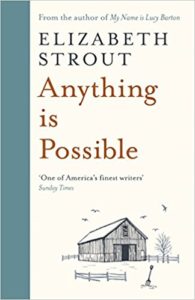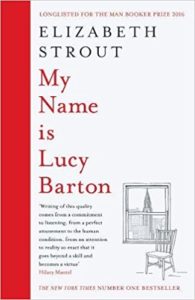Elizabeth Strout “Anything is Possible”
 It seemed the older he grew–and he had grown old—the more he understood that he would not understand this confusing contest between good and evil, and that maybe people were not meant to understand things here on earth.
It seemed the older he grew–and he had grown old—the more he understood that he would not understand this confusing contest between good and evil, and that maybe people were not meant to understand things here on earth.
…
She came to understand that people had to decide, really, how they were going to live.
Elizabeth Strout’s Anything is Possible is an exquisitely written novel about rural, dusty Amgash, Illinois. It is about the people of the town Lucy Barton had left behind when she moved to New York to become a successful writer. Lucy is the heroine of Strout’s equally well-told novel My Name is Lucy Barton. In Amgash as like any other settlement, irrespective of whether it is a small town or a big city, there is great diversity across the socio-economic spectrum. There are people like Lucy’s siblings all  of whom grew up in abject poverty and somehow managed a decent life as grownups. Since rarely do these people move out of Amgash, the past just as the present of the townspeople is an open book. It is claustrophobic and debilitating as it does not allow individuals to grow. The shadow of the past always looms large. This is precisely the reason why Lucy Barton fled. Despite this people continue to live in Amgash making adjustments to their lifestyles with growing old age and some are even successful in their social mobility.
of whom grew up in abject poverty and somehow managed a decent life as grownups. Since rarely do these people move out of Amgash, the past just as the present of the townspeople is an open book. It is claustrophobic and debilitating as it does not allow individuals to grow. The shadow of the past always looms large. This is precisely the reason why Lucy Barton fled. Despite this people continue to live in Amgash making adjustments to their lifestyles with growing old age and some are even successful in their social mobility.
This was a matter of different cultures, Dottie knew that, although she felt it had taken her many years to learn this. She thought that this matter of different cultures was a fact that got lost in the country these days. And culture included class, which of course nobody ever talked about in this country, because it wasn’t polite, but Dottie also thought people didn’t talk about class because they didn’t really understand what it was.
In Anything is Possible Lucy Barton is on a book tour in Chicago and decides to return to Amgash after seventeen years to meet her siblings. Unfortunately the flood of unpleasant childhood memories hits her as soon as she enters her parents cottage. She has a panic attack and decides to return immediately to Chicago. In the interim she has had smattering of conversations with her siblings who have updated her on the lives of people they knew as kids. None of the people have had a predictable lifestyle and it is certainly stranger than the fiction Lucy Barton possibly writes. For instance her distant cousin Abel who along with his sister Dottie would sometimes be found scavenging for scraps of food in a dumpster went on to become one of the richest men in Chicago. This story was the least sad of all that are shared. On the surface of it Amgash inhabitants were living the typical homely small-town-American lives you would expect them to have except there was a murkier underbelly to this. But as Abel Blaine realises it is possible to live the American Dream and improve on one’s status just as Lucy and he did—-“Anything was possible for anyone”.
Elizabeth Strout is known for deftly creating these fictional landscapes that are as finely detailed as a miniature painting. The characters, their personality traits, their lives and the umpteen cultural references are so well packed in the sparingly told narratives that they continue to be with one for a long time after the book is closed. She conjures up the scenes so minutely and exactly that it is crystal clear in mind’s eye. It is not surprising that Elizabeth Strout’s Anything is Possible was on President Obama’s list of favourite books of 2017. Anything is Possible is on the Rathbones Folio Prize shortlist 2018.
Two legendary women writers have endorsed these books and truer words were never said:
Hilary Mantel on My Name is Lucy Barton: “Writing of this quality comes from a commitment to listening, from a perfect attunement to the human condition, from an attention to reality so exact that it goes beyond a skill and becomes a virtue.’
Ann Patchett on Anything is Possible: “Strout proves to us again and again that where she’s concerned, anything is possible. This book, this writer, are magnificent.”
Elizabeth Strout Anything is Possible Viking, an imprint of Penguin Random House, London, 2017. Hb. pp. 260 Rs 599
Elizabeth Strout My Name is Lucy Barton Viking, an imprint of Penguin Random House, London, 2016. Hb. pp. 200 Rs 699
28 March 2018
